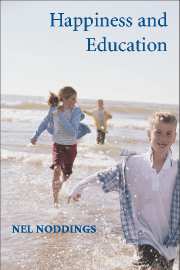7 - Parenting
Published online by Cambridge University Press: 30 June 2009
Summary
Possibly there is no human task more demanding, more rewarding, and more universal than parenting, and yet our schools apparently think that algebra and Shakespeare are more important. Parenting is supposed to be taught at home but, as our Visitor pointed out, if parents are not very good at the job, how will they teach it to their children? How will parenting improve?
In this chapter, we will consider three large topics associated with parenting and happiness. First, we will look at birth and the miracle of parental love. Second, we will consider the growing child and his or her relationship to parents. Finally, we will discuss parents as educators.
Birthing
Romance and love, at least in today's Western world, usually precede pregnancy and birth, but for many centuries love had little to do with marriage, and often the first great love in a woman's life was that for her child. A vestige of this attitude remains even today. Increasing numbers of women are having children through artificial insemination, and many teenagers have confessed to engaging in sex not for love of their partner but out of longing for a baby to love. None of this suggests that romantic love between women and men is a thing of the past, and we will look at romantic love in Chapter 9, but relationships have changed and continue to do so. Here we will concentrate on that special love of mother for child.
- Type
- Chapter
- Information
- Happiness and Education , pp. 138 - 156Publisher: Cambridge University PressPrint publication year: 2003



